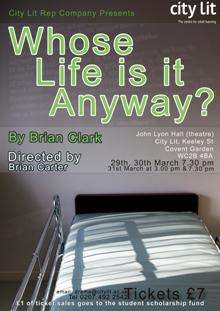Whose Life Is It Anyway? (play)
| Whose Life Is It Anyway? | |
|---|---|
 | |
| Written by | Brian Clark |
| Characters |
Ken Harrison (Claire Harrison in some later productions) Dr. Scott Dr. Emerson Mrs. Boyle Andrew Eden Dr. Barr Mr. Justice Millhouse John Peter Kershaw Sister Anderson Dr. Paul Travers Kay Sadler Philip Hill |
| Date premiered | 1978 |
| Place premiered |
Mermaid Theatre London, England |
| Original language | English |
| Subject | Accident victim, paralysed from the neck down, fights for the right to die. |
| Genre | Drama |
| Setting | a London hospital |
Whose Life Is It Anyway? is a play by Brian Clark adapted from his 1972 television play of the same title, which starred Ian McShane. The stage version premièred in 1978 at the Mermaid Theatre in London, and subsequently opened on Broadway in 1979. The play involves a sculptor who is paralysed.
Plot
Set in a hospital room, the action revolves around Ken Harrison (Claire Harrison in some later productions), a sculptor by profession, who was paralysed from the neck down (quadriplegia) in a car accident and is determined to be allowed to die. Clark presents arguments both in favour of and opposing euthanasia and to what extent government should be allowed to interfere in the life of a private citizen. In portraying Ken as an intelligent man with a useless body, he leaves the audience with conflicting feelings about his desire to end his life.
Productions
The play was televised on 12 March 1972 by Granada TV. It was directed by Richard Everitt, with the cast that featured Ian McShane (Ken), Susanne Neve (Dr. Scott), and Philip Latham (Dr. Emerson).[1]
Whose Life Is It Anyway? opened at the Mermaid Theatre, London, on 6 March 1978, before playing at the Savoy Theatre from June 1978 to October 1979. This production originally starred Tom Conti and Jane Asher;[1] Conti transferred to New York to star in the Broadway production.
The play, produced by Emanuel Azenberg and directed by Michael Lindsay-Hogg, opened on Broadway at the Trafalgar Theatre (subsequently renamed the Nederlander Theatre) on 17 April 1979 and ran for 223 performances and 9 previews. It marked the Broadway debut of Tom Conti, who was joined by Jean Marsh and Philip Bosco. Conti was nominated for a Drama Desk Award and won the 1979 Tony Award for Best Actor in a Play. Both the play itself and Lindsay-Hogg were nominated as well.
The play, again directed by Lindsay-Hogg, was revived on Broadway at the Royale Theatre, where it opened on 24 February 1980 after nine previews. A gender reversal found Mary Tyler Moore in the lead role, rechristened Claire, and James Naughton as her now-male doctor. Josef Sommer rounded out the principal cast. The play ran for 96 performances.[2] Moore was nominated for a Drama Desk Award as Outstanding Actress in a Play and won a special 1980 Tony Award for her performance.
The play was revived in London at the Harold Pinter Theatre, from 7 January 2005 (previews), officially opened 25 January 2005, and closed on 30 April 2005. The production was directed by Peter Hall and starred Kim Cattrall as sculptor Claire Harrison.[3]
Husband and wife Laurence Luckinbill and Lucie Arnaz starred in the national tour of the play. The two rotated playing the patient (Ken/Claire) and doctor.
The play returns to London from 21 June to 25 June 2016 in a production by Sedos and directed by Nick Mouton.
Adaptations
Whose Life Is It Anyway? was adapted from Clark's own television film of the same title directed by Richard Everitt starring Ian McShane.
A film adapted by Reginald Rose and directed by John Badham was released in 1981, starring Richard Dreyfuss, John Cassavetes, and Christine Lahti.
Author David Benedictus adapted the play into a novel, which was also released in 1981.
Awards and nominations
- Awards
- 1978 Laurence Olivier Award for Best New Play
- 1979 Selection, Burns Mantle, The Best Plays of 1978-1979[4]
- Nominations
- 1979 Tony Award for Best Play
References
- 1 2 Clark, Brian. "Details of First TV and Stage Productions, pp. x-xii" Whose Life is it Anyway?, Heinemann, 1993, ISBN 0435232878
- ↑ "'Whose Life Is It Anyway?' Broadway 1980" playbillvault.com, accessed December 8, 2015
- ↑ "'Whose Life Is It Anyway?' London 2005" thisistheatre.com, accessed December 8, 2015
- ↑ Guernsey Jr. (Ed.), Otis L. (1979). The Best Plays of 1978-1979. New York & Toronto: Dodd, Mead & Company. pp. 299–314. ISBN 0-396-07723-4.
- Clark, Brian (1974). Whose Life Is It Anyway? A Full-Length Play (First ed.). Chicago: Dramatic Publishing Co. OCLC 3530311.
External links
- Whose Life Is It Anyway? at the Internet Broadway Database
- Whose Life Is It Anyway? at the Internet Broadway Database
- Whose Life Is It Anyway? (1972) at the Internet Movie Database
- Whose Life Is It Anyway? (1981) at the Internet Movie Database